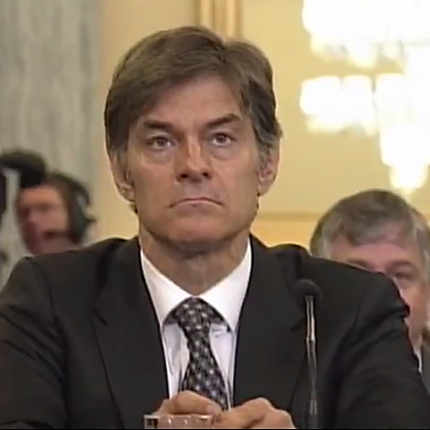Insights < BACK TO ALL INSIGHTS
Weight Loss Claims and Dr. Oz Gain Congressional Interest
Weight Loss Claims and Dr. Oz Gain Congressional Interest
By: Michelle Cohen
We’ve all heard the statistics showing obesity rates rising in the U.S. year after year. Most of us are well aware of the billion dollar diet and weight-loss supplement industry to which millions turn with the hope of finding that one “miracle pill” to help them lose that stubborn belly fat or get rid of those unsightly love-handles. Advertisers should be aware that the Federal Trade Commission has taken an interest in advertising involving weight loss claims. In a 2011 study, the FTC concluded that weight loss product false advertising is the most common type of consumer fraud. More recently, the agency testified on the issue during a June 17, 2014 hearing before the Senate Subcommittee on Consumer Protection, Product Safety, and Insurance, in addition to several witnesses from the advertising industry.
In addition to the FTC representative, witnesses who testified at the hearing included the CEO of a natural products non-profit organization, and the president of the nation’s advertising self-regulatory body. However, one witness received the most attention and the toughest questions from Subcommittee Chair, Senator Claire McCaskill, regarding the problem of deceptive advertising of weight-loss products: television personality, and Oprah-favorite, Dr. Mehmet Oz.
When asked who the most popular television personality known to talk about green coffee bean extract, raspberry ketones, pure garcinia cambogia, or just weight loss products in general, there’s a good chance that the majority of Americans would name Dr. Oz. Despite his former days as the go-to doctor of Oprah’s talk show, and the celebrity he has become through the popularity of his own daytime television show, Senator McCaskill’s tone revealed how unimpressed she is by Dr. Oz’s “flowery” language- an adjective he used at the hearing to defend his enthusiastic statements when promoting the use of unproven weight-loss products. The Senator expressed her concern with the overreaching statements often made by the doctor, specifically his use of the words “magic” and “miracle” to describe the products he endorses on his show.
To be fair, Dr. Oz is by no means the only source of flowery language when it comes to weight-loss products. Surf the web for five minutes and at least one advertisement for an all-natural weight-loss supplement that melts away fat in a matter of days will have flashed on your screen. And in his defense, Dr. Oz does not appear to promote specific product brands on his show. He also generally adds that any weight-loss enhancement product must be supplemented by a healthy diet and regular exercise. But to Senator McCaskill and the FTC, the problem is too serious to not to make an example out of Dr. Oz, especially in light of the fact that some advertisers misleadingly use the Dr. Oz name brand (among others) for product promotion. Voltaire’s saying that with great power comes great responsibility was used more than once at the hearing.
Besides the scolding of one celebrity voice, the FTC appears to have a three-fold strategy for cracking down on what it views as misleading advertising practices.
First, the agency’s law enforcement efforts have included more than 80 weight-loss enforcement actions over the last 10 years, in addition to over $100 million amassed in consumer restitution, and that’s just since 2010. In January of this year, the FTC had its own New Year’s resolution with regard to fighting back against newer fraudulent weight-loss fads, appropriately named “Operation Failed Resolution.”
Second, the FTC also recently delivered a “Gut Check” to respected media outlets: a reference guide containing a list of fraudulent claims often used by those advertising weight-loss products. The goal of the guide is to encourage media outlets to carefully consider whether or not the endorsement of such ads is advisable.
Third, the FTC has issued numerous consumer education resources to teach and inform the public about exaggerated weight-loss product claims. Also, the same day it testified at the Senate Subcommittee hearing, the agency launched an interactive “Challenge” video and game, with the goal of helping consumers understand what’s true and what’s not when it comes to weight-loss products claiming guaranteed results without the added components of diet and exercise.
The FTC’s extensive program to fight what it views as weight-loss scams and fraudulent advertising, in addition to the Subcommittee’s admonishment of “America’s Doctor,” demonstrate that truth in weight loss advertisements remain a top priority for federal regulators and legislators. Organizations offering weight loss products should review their advertisements – whether on the Internet, in print advertisements, or elsewhere – for any potentially unsubstantiated claims. The FTC will remain vigilant regarding health and fitness claims. Advertisers need to be similarly vigilant, because there’s no magic pill that prevents expensive enforcement actions and lawsuits.





